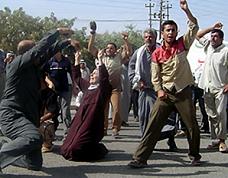الشبكي الحر
مسؤول أداري



عدد الرسائل : 1205
العمر : 44
تاريخ التسجيل : 12/03/2007
 |  موضوع: بوركت ياخنساء الشبك وانت تدافعين عن دماء الشبك موضوع: بوركت ياخنساء الشبك وانت تدافعين عن دماء الشبك  الجمعة 31 أغسطس - 21:05 الجمعة 31 أغسطس - 21:05 | |
| بوركت ياخنساء الشبك وانت تدافعين عن دماء الشبك دماء الابرياء دماء المساكين دماء المظلومين .الدماء التي اريقت من دون اي ذنب ..بوركت وانت تدافعين عن الشبك جميعا .عن مظلوميتهم عن حقوقهم عن وجودهم عن ترائهم عن ارضهم
سيجسل لك التاريخ ايتها الشبكيه الحره الابيه ايتها الخنساء ايتها الاصيله أحرف من نور وسيشهد لك ولكل شبكي وعربي وكردي اصيل دافع عن الشبك ووجودهم ووقف معهم ...

  http://lexicorient.com/e.o/shabak.htm    [size=24]  Shabak both points at a people and a religion. The Shabaks live in the region of Mosul, Iraq, and are united in culture and language, but they cover more than one ethnic group and among them there is more than one religion. Shabak both points at a people and a religion. The Shabaks live in the region of Mosul, Iraq, and are united in culture and language, but they cover more than one ethnic group and among them there is more than one religion.
 Their numbers are very hard to assess, being between 60,000 and 400,000 spread among 35 villages, of which Ali Rach, Yangija, Khazna and Talara are the largest. This encyclopaedia uses the number 100,000 to assess their number, but this is highly uncertain. Their numbers are very hard to assess, being between 60,000 and 400,000 spread among 35 villages, of which Ali Rach, Yangija, Khazna and Talara are the largest. This encyclopaedia uses the number 100,000 to assess their number, but this is highly uncertain.
 Throughout their history, the Shabaks have been considered a low class in the Iraqi society, although there are few reports of persecution, despite them being defined outside the Ahl al-Kitab, the book people. Still, during recent decades, the Shabak have faced the hardship of being dislocated, as an initiative of the central Iraqi authorities to destroy their cultural identity. Throughout their history, the Shabaks have been considered a low class in the Iraqi society, although there are few reports of persecution, despite them being defined outside the Ahl al-Kitab, the book people. Still, during recent decades, the Shabak have faced the hardship of being dislocated, as an initiative of the central Iraqi authorities to destroy their cultural identity.
 A common theory, is that the Shabak are of Turkomen origins, and migrants from Persia in the 17th century. A common theory, is that the Shabak are of Turkomen origins, and migrants from Persia in the 17th century.
 A large part of the Shabak are related to Kurds as well as Turkmen. Their name is a reflection of their ethnic diversity, in Arabic 'shabak' means "intertwine" and subgroups of the Shabak are known as Gergari, Bajalan, Hariri and Mosul. A large part of the Shabak are related to Kurds as well as Turkmen. Their name is a reflection of their ethnic diversity, in Arabic 'shabak' means "intertwine" and subgroups of the Shabak are known as Gergari, Bajalan, Hariri and Mosul.
 Their language is ranked with the Zaza, meaning that they speak a form of Zazaki. It has similarities with Kurdish, but has taken many elements from Turkish, Persian and Arabic. Their language is ranked with the Zaza, meaning that they speak a form of Zazaki. It has similarities with Kurdish, but has taken many elements from Turkish, Persian and Arabic.
 A large part of the Shabak community are noted for a unique religion, which they themselves will say is Islam, but which has every characteristic of an independent religion. They even have their own sacred book known as Buyruk, written in Turkoman. The Shabak faith does contain elements of Islam, as well as Christianity and other religions. There is a close affinity between the Shabak and the Yazidis, and Shabaks perform pilgrimage to Yazidi shrines. A large part of the Shabak community are noted for a unique religion, which they themselves will say is Islam, but which has every characteristic of an independent religion. They even have their own sacred book known as Buyruk, written in Turkoman. The Shabak faith does contain elements of Islam, as well as Christianity and other religions. There is a close affinity between the Shabak and the Yazidis, and Shabaks perform pilgrimage to Yazidi shrines.
 A considerable part of Shabaks are Muslims, and according to the scarse information, they are Sunnis. The distribution between Shabak believers and Muslims seem to be 70,000 or more Shabaks and 30,000 or more Muslims, but this is only a rough estimate. A considerable part of Shabaks are Muslims, and according to the scarse information, they are Sunnis. The distribution between Shabak believers and Muslims seem to be 70,000 or more Shabaks and 30,000 or more Muslims, but this is only a rough estimate.
HISTORY
17th century: Probable immigration of the Shabak from Persia into the Nineveh plain of Mesopotamia.
1952: The Shabak is recognized as a distinct ethnic group.
1980's: About 22 villages, 3000 families are dislocated to the north of Iraq.
2003: Kurdish troops move into Shabak areas, and come to define them as "Kurd Shabaks."
2005: Shabaks demonstrate for being treated as an independent group. Gunmen from the KDP shoot at the crowd, injuring several.
| |
|
